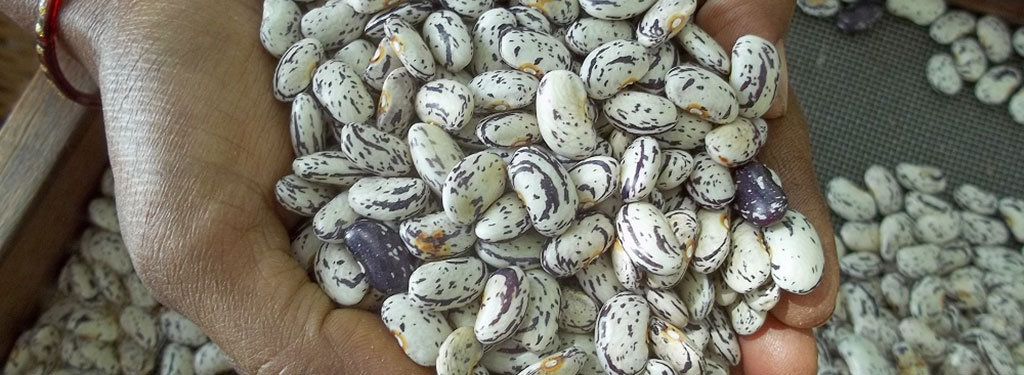Seed Knowledge

What is a seed?
A seed is a reproductive structure containing a fertilized embryonic plant in an arrested state of development. It is in dormancy until sown. Seeds vary in color, shape, size and texture.
Seeds are the basis of food production. A contaminated seed means a contaminated food chain.
What are the different kinds of seeds?
| Type |
Description |
Features |
|
|
Open-Pollinated |
Pollinated by natural means (wind, insects, birds). Either within the same flower or between 2 flowers of the same plant. |
|
|
|
|
Heritage seeds are those that have been in existence for more than 50 years. | ||
|
|
Heirloom seeds are those that have been around for more than 300 years. | ||
|
Hybrid / Improved |
Produced by pollinating 2 or more open-pollinated varieties in the laboratory, for promoting specific characteristics of the parent plant(s). |
|
|
|
Genetically Modified |
A gene of a plant, animal or microorganism is added to the DNA of an existing open-pollinated seed for enhancing specific features. |
|
|
Why are Open-pollinated seeds important?
- Open-pollinated seeds are the only replicable seeds that farmers can save themselves for future seasons, for future generations – with consecutive saving each year.
- Since traditional OP varieties are adapted to small-scale farming, they rely on crop rotation, crop diversification and a systematic varietal mix of crops with different genetic makeup. This preserves a rich bio-diversity.
- OP seeds are characterized by polygenic resistance to pest and diseases while being genetically diverse. They insure the farmer against pest outbreak, crop losses, biotic and abiotic stresses.
- OP seeds contain more micro-nutrients that combat malnutrition and micro nutrient deficiency. Traditional varieties are very tasty and nutritious.
For millennia, seeds have been an integral part of farmers’ rich heritage. However in just the last 100 years, farmers and gardeners have become increasingly dependent on seed companies with the introduction of more hybrid varieties (driven by a created market demand for higher yield). Today just five large multinational corporations that control 75% of the world’s vegetable seed market.
Farmers today prefer to use hybrid varieties that ensure greater yield; but this comes at the cost of an irreversible loss of open-pollinated varieties that have withstood environmental conditions for many thousands of years.
What do we lose if OP varieties become extinct?
- Loss of Nutrition: Hybrid varieties have been designed to produce more (greater quantity). This mass production is devoid of nutrition. Over the years, our food is less in essentials nutrients due to loss in varietal selection and soil health.
- Erosion of diversity: Hybrids and GM varieties are create to look all the same (color, shape, taste, size). They have to be perfect. But they have lost the uniqueness of the parent variety and therefore the diversity. According to FAO, 75% of culture varieties have been lost this last century.
- Destruction of the food chain: Farmers prefer to use hybrid varieties, that can give higher yield but need harmful chemicals like pesticides and herbicides to grow. These chemicals are harmful to humans and other life forms too. Every year, more and more insects die due to poisoning. 35% of global food production is directly dependent on pollinators. 80% of plants need pollinators to multiply. If they disappear, it will be a huge loss for humans and nature. The whole ecosystem that used to exist in harmony will suffer tremendously leading to a cycle of destruction of the food chain.
- Soil Erosion Monoculture is the main focus of mainstream agriculture today. This makes the soil poor and unhealthy. Every year, India is losing 5.5 million acres of top soil due to wind and water erosion. If we do nothing, it is believed that by 2050 all Indian arable land will become desert.
Why do we have to save seeds?
- Variety adaptation: Heritage varieties can be adapted to your own growing conditions. Selection made by farmers and gardeners for millennia created thousands of varieties. These varieties are vigorous and adapt to droughts, flood resistant and several rich traits.
The yields can be equivalent to hybrids given the soil health and nourishment.
Hybrids varieties cannot adapt unless chemical fertilizers and pesticides are applied. Massive amount of water is used with high yields, shallow nutrients but leaves soil barren with destruction to health of the eco system
- Preserve our right: Variety patenting, licensing agreements and other forms of seed control by large companies ensure that farmers have no say in the kind of varieties they would like to save and grow. They live in a constant cycle of dependency and debt. On the other hand, sowing and saving OP varieties will ensure that the farmer can save seeds, money and preserve her/his fundamental right to safe food that costs less and is highly nutritious and tasty.
- Farmers’ conditions: Policies are designed to suit seed corporation but not farmers and agriculture. Subsidies are given for chemical fertilizer and pesticides but not for safe agriculture practices. All seeds and chemicals products are so expensive that farmers cannot afford it, hence in debt and the consequence is suicides. If there is political-will to conserve heritage seeds, our farmers will be able to produce chemical-free, nutrient-rich food for our society.



